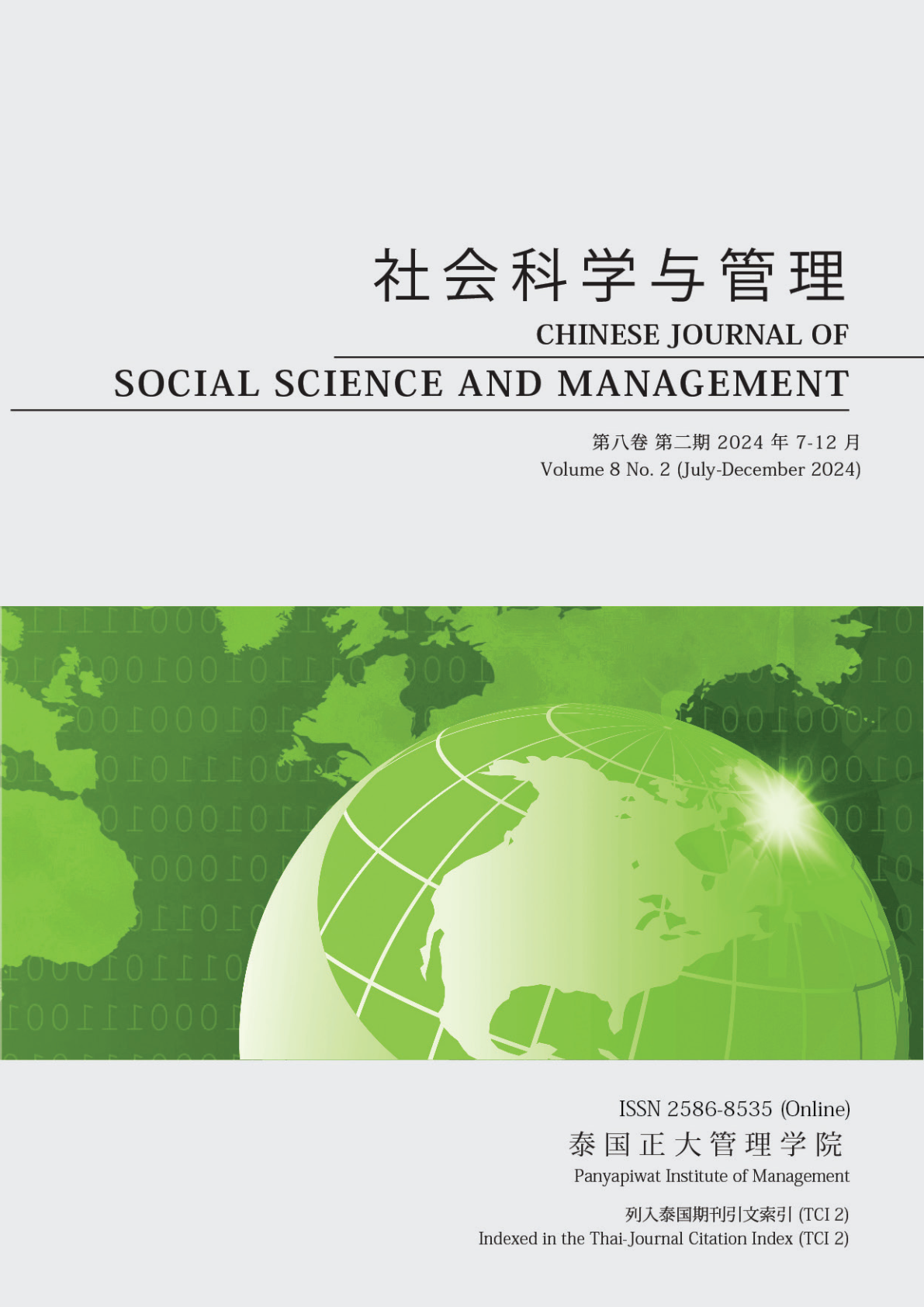THE IMPACT OF DIFFERENTIATION STRATEGY ON CORPORATE SOCIAL RESPONSIBILITY AND CORPORATE PERFORMANCE
Main Article Content
Abstract
This study discusses the impact of differentiated strategies and corporate social responsibility on corporate performance, and has established a model of differentiated strategies, corporate social responsibility and corporate performance. This study took the balanced panel data of A-share listed companies in China in 2015-2019 as the research object. This study used SPSS and STATA software to analyze the sample data and verify the intermediary effect using Sobel, and to verify the intermediary effect through SOBEL inspection. Results showed that the implementation of differentiated strategies and the performance of corporate social responsibility had a significant impact on corporate performance. The differentiated strategy had a significant impact on corporate social responsibility. Has the intermediary effect. These research results can provide enterprises with ideas and directions to improve and optimize corporate strategies, thereby achieving higher levels of development.
Article Details

This work is licensed under a Creative Commons Attribution-NonCommercial-NoDerivatives 4.0 International License.
Chinese Journal of Social Science and Management Editorial Division
The Office of Research and Development, Panyapiwat Institute of Management
85/1 Moo 2, Chaengwattana Rd., Bang Talat, Pakkred, Nonthaburi 11120, Thailand
Tel. 02 855 01048 E-mail: cjssm@pim.ac.th
References
Bao, X. Z. (2014). Study on the relationship among competitive strategy, innovation R&D investment and enterprise performance. Forum on Science and Technology in China, (6), 63-69. [in Chinese]
Chen, C. M. (2002). The path dependence characteristics of enterprise strategic adjustment and its transcendence. Journal of Management World, (6), 94-101. [in Chinese]
Chen, S., & Pang, Z. Q. (2014). Environmental uncertainty on competitive strategy and enterprise. Forum on Science and Technology in China, (2), 57-63. [in Chinese]
Cui, L. Q., & Zhang, Z. (2020). Research on the impact of financial flexibility on R&D investment of emerging manufacturing enterprises-based on the dual effects of competitive strategy. Modernization of Management, 40(3), 68-73. [in Chinese]
David, S. J. (2002). The performance effects of congruence between product competitive strategies and purchasing management design. Management Science, 48(7), 866-885.
He, Y. (2011). Research on the relationship between social responsibility and performance of multinational corporations in China. Jiangsu Business Theory, (4), 150-151. [in Chinese]
Jones, T. M. (1995). Instrumental stakeholder theory: A synthesis of ethics and economics. Academy of Management Review, (20), 404-437.
Li, M., & Wong, Y. Y. (2003). Diversification and economic performance: An empirical assessment of Chinese firms. Asia Pacific Journal of Management, 20(2), 243-265.
Liu, R. Z., & Xu, C. Y. (2008). Competitive strategy, firm performance and sustainable competitive advantage—Empirical evidence from Chinese listed companies. Science Research Management, 29(6), 36-43. [in Chinese]
Lu, Z. W., & Liu, C. L. (2012). Research on the impact of charitable donations on corporate performance-based on the consumer perspective. Journal of Shanxi Finance and Economics University, 34(2), 81-88. [in Chinese]
Ma, H. J. (2016). Research on the relationship between strategic choice, ambidextrous innovation and the performance of born-international enterprises. Studies in Science of Science, 34(10), 1550-1560. [in Chinese]
Narver, J. C., & Slater, S. F. (1990). The effect of a market orientation on business profitability. Journal of Marketing Volume, 54(4), 20-35.
Porter, M. E. (1980). Competitive strategy: Techniques for analyzing industries and competitors, competitive strategy. Free Press.
Qian, Y. (2013). Canonical correlation analysis of corporate social responsibility and corporate performance-based on the perspective of stakeholders. Enterprise Economy, (3), 79-82. [in Chinese]
Qiao, P. C. (2022). Differentiation strategy, innovation investment and corporate performance—Empirical test based on mediating effect. Journal of Tianjin University of Commerce, 42(4), 46-52. [in Chinese]
Shi, J. W., & Hu, L. J. (2009). Corporate social responsibility, social capital and organizational competitive advantage: A strategic interaction perspective—An empirical study based on the experience of China’s transition period. China Industrial Economics, (11), 87-98. [in Chinese]
Sun, W., & Ding, Y. (2020). Corporate social responsibility and cash flow volatility: The curvilinear moderation of marketing capability. Journal of Business Research, (116), 48-59.
Tan, J., & Luo, Z. Y. (2017). Managers’ turnover, competitive strategy and corporate social responsibility—A research from perspective of strategy coupling. Journal of Shanxi University of Finance and Economics, 39(5), 82-93. [in Chinese]
Wang, Z. J. (2021). Competitive strategy, capital operation and enterprise performance. Economic Survey, 38(6), 103-112. [in Chinese]
Wang, C., & Zhu, H. (2017). Research on the correlation between corporate social responsibility and financial performance—The perspective of stakeholders. China Collective Economy, (5), 62-64. [in Chinese]
Wu, G. S., & Lin, L. (2011). Empirical research and policy recommendations on “service enhancement” of Chinese manufacturing enterprises. Journal of Industrial Engineering: Engineering Management, 25(4), 87-95. [in Chinese]
Xu, G. (2020). Does corporate social responsibility inhibit the goodwill bubble? Journal of Audit & Economics, 35(1), 90-99. [in Chinese]
Xu, Z. C., & Hou, J. C. (2019). Innovation investment, competitive strategy and enterprise performance level. Modern Finance and Economics Journal of Tianjin University of Finance and Economics, (9), 56-68. [in Chinese]
Yuan, D. Y. (2014). Differentiation strategy and sustainability of competitive advantage: Theoretical and case studies. Journal of Technology Economics, (5), 118-124. [in Chinese]
Yuen, K. F. (2017). Corporate social responsibility and classical competitive strategies of maritime transport firms: A contingency fit perspective. Transportation Research Part A: Policy and Practice, (98), 1-13.
Zhang, H., & Luo, L. Y. (2021). The impact of competitive strategy and social responsibility on corporate market performance study on synergistic effect. Chinese Journal of Management, 18(8), 1204- 1211. [in Chinese]


